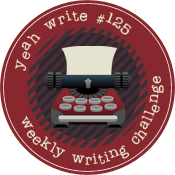We visited her at the nursing home just a few days before she died. I was 25, yet I remember it so clearly. Geoff drove, and my aunt stayed back because there wasn’t enough room in the car.
Bubbie had sent instructions, of course: Bring Hershey bars. We stopped at Rite Aid on the way, but they were out, so I picked M&Ms instead. The nursing home was in a small, tidy building with a garden in front. The bright, colorful lobby felt almost cheerful. As we moved past the entrance into the patient area, we said hello to the patients lining the hall in their wheelchairs. Some responded but some were sleeping, their minds elsewhere. The intense smell of pee and beeping machines reminded us of illness and imminent death.
Bubbie waited for us, sitting in her wheelchair just inside the door to her room. I don’t remember why, but she couldn’t talk. Perhaps it was an effect of her recent stroke, maybe her voice escaped her body ahead of time. Nevertheless, I remember her mumbling for Rose Ann, my aunt, incoherently. My mom explained that my aunt had stayed back at the house. Bubbie also asked for my uncle, Norman; Norman who was her favorite child, who deceived her so coldly in the end, my uncle, who had fled back to his home across the country just days earlier.
So Bubbie made due with just us four – my mom, her sketchy but well-meaning husband, Geoff, and me. We kept our visit upbeat, chatting and laughing the whole time. Bubbie eyed us as though she wasn’t quite sure who we were. But maybe she was just angry at us, at me. I handed her M&Ms one by one from the package, hoping that my last-ditch effort would make her love me in the end. Who knows if it worked? She accepted the candy like a child, but still her face stayed as locked up as always.
Here’s the thing about having a grandmother who hates you, or one who at least withholds her affection for you even in the face of your own attempts at loving her: You learn how to handle others’ disapproval. You learn that you can’t ever control someone else’s emotions, even when you try. You learn how to seek your own approval from within yourself before seeking it from others, even from your family.
When you see your grandmother reject your achievements and reward your sister’s failures and illnesses, you learn that not everything is as it seems. No, sometimes love is hate and hate is love. When all that your grandmother offers you is anger and hatred, you learn that sometimes emotions are their opposite. You accept the paradoxical, the impossible, the ambiguous.
When your grandmother serves you a big plate of rocks instead of cookies, and when you are a good girl like I was, you eat up those rocks, smile, and pretend they are cookies. You just accept it. And years later, you might find yourself, as an adult, in a tough situation. You might one day feel broken down in some way, challenged. If you really focus on what’s going on inside you, you’ll feel those rocks still in your belly after so much time, and you’ll know for certain that everything is going to be fine.
If I could go back to that day in the nursing home with my Bubbie, I would thank her for always knowing how much I was capable of, for demanding the most from me, and accepting nothing. My Bubbie always made me work harder.
It looks like I have a secret admirer! Thanks to whomever nominated me for this awesome linkup.


